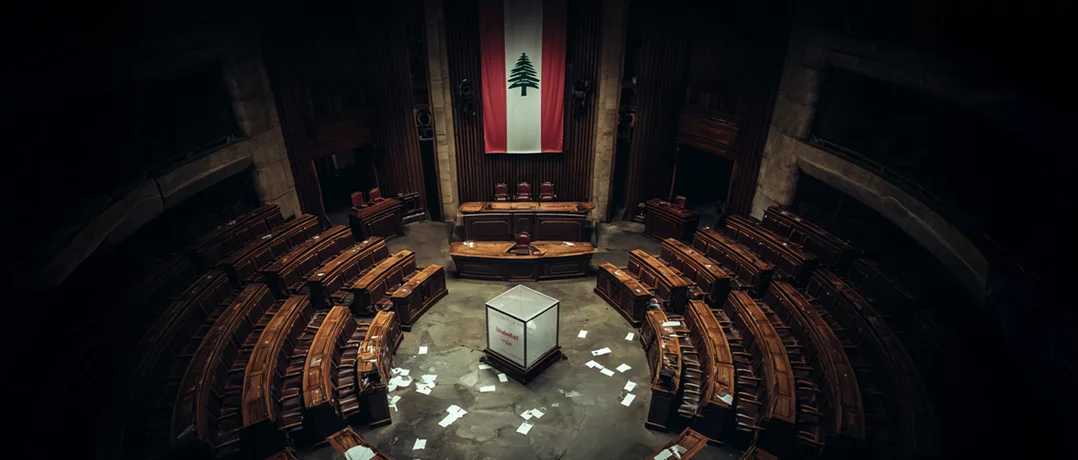Disputes over expatriate
Lebanon’s 2026 elections in doubt as parliament deadlocks over expatriate vote
Lebanon’s 2026 elections in doubt as parliament deadlocks over expatriate vote


Speculation is mounting over whether Lebanon’s 2026 parliamentary elections will proceed on schedule, as fresh clashes in Parliament over amendments to the electoral law have once again paralyzed the legislature.
Parliamentary Deadlock
On Tuesday, a general legislative session called by Speaker Nabih Berri failed to reach quorum, with fewer than 50 MPs in attendance. Lawmakers from the Lebanese Forces (LF), Kataeb, and several independents boycotted in protest of Berri’s refusal to include electoral law amendments on the agenda.
The walkout followed a stormy session on Monday, when disputes over expatriate voting rights boiled over. Under the current law, Lebanese abroad may only vote for six designated seats. Opposition parties want expatriates to be able to cast ballots for all 128 seats, while Hezbollah and its ally Amal argue that such a system would put them at a disadvantage abroad, where rivals are better positioned to campaign.
Parliamentary Deadlock Deepens Over Expatriate Voting Dispute
A general legislative session convened by Speaker Nabih Berri on Tuesday collapsed due to lack of quorum, with fewer than 50 MPs present. Lawmakers from the Lebanese Forces, Kataeb, and several independents boycotted in protest of Berri’s refusal to include amendments to the electoral law on the agenda.
The boycott came a day after a heated Monday session that exposed growing divisions over expatriate voting rights. Under the current law, Lebanese citizens living abroad may only vote for six designated seats reserved for the diaspora. Sovereign Political Parties are demanding a reform that would allow expatriates to vote for all 128 parliamentary seats, arguing that limiting their representation undermines equal suffrage.
Hezbollah and the Amal Movement, however, reject the proposal, claiming that full diaspora participation would disadvantage their candidates abroad, where opposition parties have stronger networks and broader campaign reach.
As the standoff continues, the deadlock threatens to delay critical legislative work and heightens concerns that the ongoing electoral dispute could derail preparations for the 2026 parliamentary elections.
Government Reaffirms Commitment to 2026 Election Timeline
Amid mounting speculation over a possible delay, government officials have sought to dispel fears that the 2026 parliamentary elections could be postponed. President Joseph Aoun and Interior Minister Ahmad al-Hajjar both reaffirmed that the polls will take place as scheduled in May 2026, stressing the state’s commitment to upholding the constitutional timeline.
Despite the ongoing political impasse in Parliament, technical and logistical preparations for the vote are proceeding. Richard Harfouch, advisor to the foreign minister on expatriate voting, told The Beiruter that registration for Lebanese abroad will open from October 2, 2024, to February 20, 2025, in coordination with the Ministry of Interior. He noted that the process will adhere to the current legal framework, regardless of potential amendments to the electoral law. According to Harfouch, registration has been simplified this year: embassies and consulates will distribute explanatory videos and digital applications, eliminating the need for additional staff training.
At this week’s Cabinet session, Prime Minister Nawaf Salam proposed a draft law introducing QR code based voting to replace outdated magnetic cards. He also tasked Minister Hajjar with consulting Parliament on the contentious issue of expatriate voting rights specifically, whether Lebanese abroad should be allowed to vote for all 128 MPs instead of six designated seats. Justice Minister Adel Nassar, however, called for merging both reforms into a single comprehensive bill, a move that risks further delaying consensus within the Cabinet and Parliament alike.
Political Blame
Party leaders quickly traded accusations over who is maneuvering to delay the vote. The Lebanese Forces rejected claims it was seeking postponement, blaming instead “the resistance forces,” the Free Patriotic Movement (FPM), and allied independents. Kataeb leader Samy Gemayel echoed the warning against any delay, while FPM chief Gebran Bassil said his party’s boycott aimed to ensure expatriates are properly registered for 2026.
Expert’s Warning
Political analyst Dr. Elie Elias warned that the risk of postponement is real, pointing to the clash over expatriate voting as the decisive factor. “The deadlock centers on whether expatriates can vote for all 128 seats or only six symbolic ones,” he told The Beiruter.
Allowing full participation threatens the power base of Speaker Berri and Hezbollah, who rely on domestic clientelism. Faced with that risk, Berri may prefer postponement.
Elias argued that by blocking diaspora voting, Berri and his allies are “trying to impose an unconstitutional monopoly of power.” He cautioned that any delay would further erode public trust, showing citizens that Lebanon’s ruling elite “values its survival over democracy” and confirming fears that sovereignty is being sacrificed to entrenched interests tied to Syria and Iran.
Uncertain Road Ahead
For now, officials insist the elections will proceed in May 2026. Yet with Parliament gridlocked and rival factions weighing the risks of a vote under current rules, the coming months will test whether Lebanon’s fragile political class can uphold its constitutional duty or allow the cycle of delay and distrust to deepen further.


